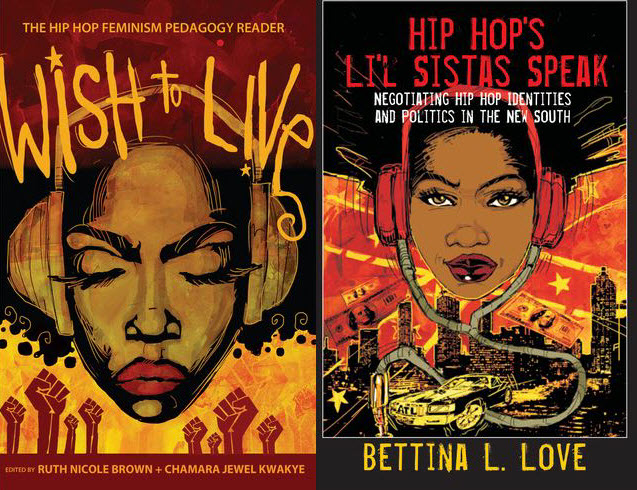 In a two-part series called Meet the Authors, the CFC talks to Drs. Ruth Nicole Brown, Chamara Jewel Kwakye, and Bettina Love about their recently released books, Wish to Live: The Hip-Hop Feminist Pedagogy Reader and Hip hop’s Li’l Sistas Speak: Negotiating Identities and Politics in the New South. Both books describe Black girlhoodand hip hop feminist teaching in the university and community classroom. Ruth Nicole and Chamara coordinate SOLHOT (Saving Our Lives Hear Our Truths), which is a multi-sited, community-based space developed to celebrate and affirm Black girl genius using art. Bettina organizes, Real Talk: Hip Hop Education for Social Justice, an after-school program for elementary school-aged students aimed at promoting issues of social justice through hip hop education. Part I covers hip hop feminism as pedagogy or the art of teaching. Part II will explore the body and hip hop feminism as Black feminist thought.
In a two-part series called Meet the Authors, the CFC talks to Drs. Ruth Nicole Brown, Chamara Jewel Kwakye, and Bettina Love about their recently released books, Wish to Live: The Hip-Hop Feminist Pedagogy Reader and Hip hop’s Li’l Sistas Speak: Negotiating Identities and Politics in the New South. Both books describe Black girlhoodand hip hop feminist teaching in the university and community classroom. Ruth Nicole and Chamara coordinate SOLHOT (Saving Our Lives Hear Our Truths), which is a multi-sited, community-based space developed to celebrate and affirm Black girl genius using art. Bettina organizes, Real Talk: Hip Hop Education for Social Justice, an after-school program for elementary school-aged students aimed at promoting issues of social justice through hip hop education. Part I covers hip hop feminism as pedagogy or the art of teaching. Part II will explore the body and hip hop feminism as Black feminist thought.
Crunklife: How do you marry hip hop feminism with pedagogy in your new books?
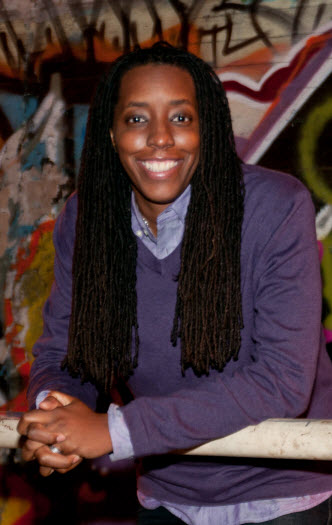
Bettina: Hip hop feminism is a way of life, the way I see the world. I’m an educator. Before I was ever a researcher, a scholar, a writer, I was an elementary school teacher, so hip hop feminism and pedagogy just works for me in the classroom. I also think working with young girls to create a space for them that they don’t get in schools. I think young girls, especially young Black girls, feel so disconnected from school. Their culture isn’t there. Their stories aren’t there. Who they are is not there in formal education. To merge those worlds for me as an educator and as a hip hop feminist just feels so natural and so right because I know the potential of these girls. If we can work in spaces where there is shared knowledge and produce this shared knowledge, it’s just powerful.
Chamara: I think it is definitely a way of life and how we see the world. It is marrying the things that we see in our daily lives as Black women and bringing those elements into the classroom in different ways and shapes and forms. The classroom, not just being in these formal spaces but being in informal spaces in the community, is where we get together and talk about the ways in which our world is being shaped by—not just the music, but—the kind of things that are going on around (us) and in the everyday-ness in our lives. The book had a great book cover design and was taking the things that we had done in the community in Champaign-Urbana (IL) and then asking other people who had been a part of that or who had been a part of the Hip Hop Feminism class (at the University of Illinois) to share the things that they’re doing and the way that they brought hip hop into these spaces.
Crunklife: You talk about working inside and outside of the classroom. You all work with girls. Could you talk about that? What do the girls teach us as homegirls? What do they teach us about ourselves?
Bettina: I have a chapter in my book that talks about starting my research with my limitations. I walked into this research project thinking that I knew everything about Atlanta and I knew everything about hip hop. I looked like these girls. I never thought that I had to address all of my messiness that I had in my life. These girls brought it out of me.
My queerness was on display for them. During the first interaction I had with these girls, they walked up to me and said, “You gay?” Being quick-witted and not wanting to put my guard down, I said, “You in my business.”
I could not research them, get to know them, understand them, and tell their stories until they put me on blast. They did something that was very interesting. They started talking about lesbians in their school an earshot away from me. I truly believe that they did this to let me know: Let your guard down. We’re cool. Talk to us. I couldn’t tell their stories until they put me on blast. It was an awesome, awesome experience because they wanted to tell their stories.
They are just so smart and they’re ready to critique, and they’re ready to be heard. I was there wanting to do that but I didn’t know how to do that. It helps as a researcher or someone doing this work in the community to address your stuff, your messiness when you walk into these spaces with these girls. I’ve had to address my notions of southern-ness. I’m from New York. I had to understand what my mother said about country folk, stereotypes, and all this internalized homophobia that I walked into this space with, the girls helped me to confront.
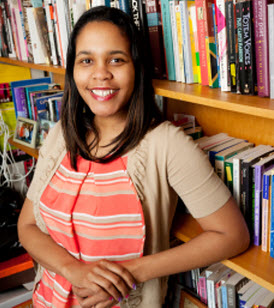
Ruth Nicole: I definitely echo the messiness. We see the same exact thing in SOLHOT where they call you out whatever it is when you least likely want to talk about it. They put it out there. In SOLHOT, we’ve had homegirls that have really stepped up and embraced it, and we’ve had others that once they got called out, they cried and left, you know. She said this about me. Or, this is too much. I got to go. Maybe some people are just not ready to deal with it.
Those who stay, there’s a lot to be said about the power and the presence of a woman who can address her complexities and articulate them and share them. I think that the formal classroom, the university classroom, is so into consumer education. I’m big on that lately because it’s like the students really don’t want to know what I know or what we can learn from each other. It’s, “Can I get your signature so I can leave?”
This is why outside of the university classroom is where education and learning happens in a very sincere way. We approach each other as people first without having to fight all of the isolation and the complicity that the university sets up. We can just really ask each other questions and have a real learning experience. The girls in SOLHOT drop knowledge all the time. We are there to learn from them. Like we always say [in SOLHOT], “what the work is.” We don’t presume to know what the work is before we get together with whatever group that is SOLHOT. The girls taught me how to fix a CD when it’s scratched by dropping it in a toilet. We thought we knew what we were doing, but they taught us that. The girls constantly teach me that when one of them gets suspended, the question is not, “What did she do or what happened?” But we ask what happened to her because it’s always the person that responds that gets caught. So, we connect to her first. She reacted and subsequently got in trouble. So those are just a few that I’ve learned.
Bettina: I also think as Black feminists, it calls us to get outside of the ivory tower. It really does. To do this work and to live this work, you will not be able to do this work with integrity if you only stay in higher ed.
Crunklife: But do we want to make those divisions? What if there are first generation people like me who are now taking classes in school and see it as being part of their Black feminist construction as well?
Bettina: I think you’re right. I think we have to be in both, but we have to make sure this work hits the community.
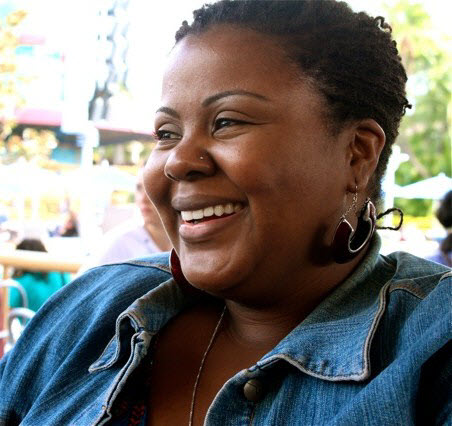
Chamara: I agree with most of the things that have been said. There’s no way that you can talk about somebody else’s life without being called out about the stuff in your life. There’s just no way that you can do that with any real connection to that person or with any integrity.
You’re trying to write about somebody else’s life and interrogate their life and you haven’t really looked at your own life. I don’t know anybody who’s done that successfully and it reads well. It will read like you’re five feet away as opposed to actually being in the moment and connecting with that person. So with the girls, really again, echoing what Bettina has said and what Ruth Nicole has said, there’s no way that you’re not going to get called out. And so, going into that space, you really have to be okay with being called out or really learn quickly on your feet because this is what’s going to happen. In order to do this work well and not be overwhelmed by it, you’re going to have to start interrogating your own self.
The girls are constantly, in SOLHOT, calling you out. For me, last year, it was my break-up. I may have said one thing about it, and they were like, “Did you bust the windows out his car?” They were going to call me out, but it was also taking care of me too in a way. By that time, I had spent a considerable amount of time with them and they were really checking in to make sure I was okay. If I had gone in there with my guard up, I would have never gotten to that space of care where they actually showed me that they wanted to make sure I’m okay. How are you surviving this moment? That’s what I learned from them. If you allow people to call you out on your stuff, they will also be there to take care of you too. It’s not just a one-way relationship where I am checking in on them. They want to know what’s going on outside of the spaces that we’re in. It becomes a reciprocal relationship where we’re checking in on them and they are checking in on us.
For more information about books, please visit Amazon.com:
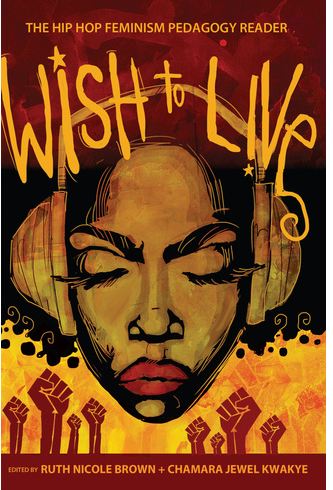 Wish To Live: The Hip-hop Feminism Pedagogy Reader moves beyond the traditional understanding of the four elements of hip-hop culture—rapping, breakdancing, graffiti art, and deejaying—to articulate how hip-hop feminist scholarship can inform educational practices and spark, transform, encourage, and sustain local and global youth community activism efforts. This multi-genre and interdisciplinary reader engages performance, poetry, document analysis, playwriting, polemics, cultural critique, and autobiography to radically reimagine the political utility of hip-hop-informed social justice efforts that insist on an accountable analysis of identity and culture. Featuring scholarship from professors and graduate and undergraduate students actively involved in the work they profess, this book’s commitment to making the practice of hip-hop feminist activism practical in our everyday lives is both compelling and unapologetic. (Source: Amazon.com)
Wish To Live: The Hip-hop Feminism Pedagogy Reader moves beyond the traditional understanding of the four elements of hip-hop culture—rapping, breakdancing, graffiti art, and deejaying—to articulate how hip-hop feminist scholarship can inform educational practices and spark, transform, encourage, and sustain local and global youth community activism efforts. This multi-genre and interdisciplinary reader engages performance, poetry, document analysis, playwriting, polemics, cultural critique, and autobiography to radically reimagine the political utility of hip-hop-informed social justice efforts that insist on an accountable analysis of identity and culture. Featuring scholarship from professors and graduate and undergraduate students actively involved in the work they profess, this book’s commitment to making the practice of hip-hop feminist activism practical in our everyday lives is both compelling and unapologetic. (Source: Amazon.com)
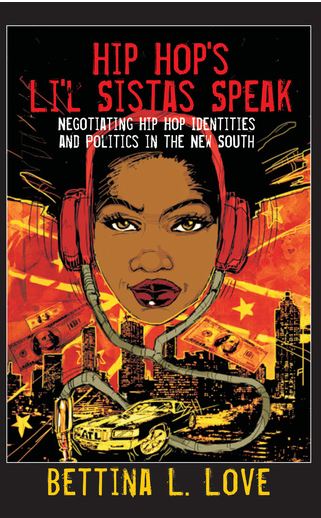 Through ethnographically informed interviews and observations conducted with six Black middle and high school girls, Hip Hop’s Li’l Sistas Speak, explores how young women navigate the space of Hip Hop music and culture to form ideas concerning race, body, class, inequality, and privilege. The thriving atmosphere of Atlanta, Georgia serves as the background against which these youth consume Hip Hop, and the book examines how the city’s socially conservative politics, urban gentrification, race relations, Southern-flavored Hip Hop music and culture, and booming adult entertainment industry rest in their periphery. Intertwined within the girls’ exploration of Hip Hop and coming of age in Atlanta, the author shares her love for the culture, struggles of being a queer educator and a Black lesbian living and researching in the South, and reimagining Hip Hop pedagogy for urban learners. (Source: Amazon.com)
Through ethnographically informed interviews and observations conducted with six Black middle and high school girls, Hip Hop’s Li’l Sistas Speak, explores how young women navigate the space of Hip Hop music and culture to form ideas concerning race, body, class, inequality, and privilege. The thriving atmosphere of Atlanta, Georgia serves as the background against which these youth consume Hip Hop, and the book examines how the city’s socially conservative politics, urban gentrification, race relations, Southern-flavored Hip Hop music and culture, and booming adult entertainment industry rest in their periphery. Intertwined within the girls’ exploration of Hip Hop and coming of age in Atlanta, the author shares her love for the culture, struggles of being a queer educator and a Black lesbian living and researching in the South, and reimagining Hip Hop pedagogy for urban learners. (Source: Amazon.com)

Good for you! Wishing you much success. I’m sharing on FB and twitter.
Thanks for sharing!
You’re welcome. Just helping you promote. 🙂
I am so happy to see this work and it is very reminiscent of my own work in Atlanta–so awesome to see this–beaming!!!
Khalilah, you can follow the work of Real Talk in Atlanta at http://www.bettinalove.com/2012/09/12/real-talk-hip-hop-education-for-social-justice/. Bettina and other folks from the CFC and SOLHOT work with girls and are in your neck of the woods.
Where are the parents in this type of “work”? I want to know what is going on in my child’s classroom and why. Why would my child’s teacher discuss a break up with him/her, and joke about ensuing violence? This is one of the reasons the teaching profession has lost respect over the years. I can’t think of any other (especially in the social services field) profession where such blase banter with clients is acceptable. What, really, are your motives? Is this supposed to be any less exploitative, biased, and agenda-driven simply because the practioners are black and female? I am a bit skeptical about academics entering communities with social agendas, which have been fully announced in this article. I see that you are profiting (publishing) from interacting with them, but in what ways are they profiting? Were there any measurable objectives in beginning this project? What results arose from program evaluation? Were the spillover benefits– did students excel in other classes, were disciplinary problems decreased, what about violence and pregnancy statistics for students in the classroom and the campus as a whole? Did students involved in this program take on leadership roles on and off campus? Do you have numbers and stats to back up this type of project, and not just “feel good” messages? I see the qualitative reporting, but where is the quantitative– because yes, numbers are still important, and both measurements are essential to seeing the bigger picture. I’m reading a lot about dialogue and interpersonal connection and communication, but what academic learning took place in these spaces, and how effective were they? Technically, school is still for learning and any pedagogy taking place on campus or addressing education must be preparing students to excel academically. Even in after school programs, the same still applies. Now, if you can elucidate how this type of curriculum is proven to contribute to my child’s likelihood to achieve success in academics, which is why they are there, you have a case I am willing to hear. I understand establishing non-profit organizations and spaces to conduct experimental social work, but really, on the campus I want my child to simply learn– whatever else they are curious about addressing, I would like to converse with them on my own and then explore, decide, and initiate that on my own as a parent. What I don’t want is another academic with personal and political motives,or another institution pushing a book or a model or a project taking on that role in the subterfuge of after school spaces.
This comment is unnecessarily cynical, accusatory and ridiculous. That you read the whole post and came away suspicious about students inquiring in an out-of-school space about a break up suggests to me that you must not spend a lot of time with teenagers. They are inquisitive and insightful. They see our “stuff” sometimes when we don’t even see it. And they long for authenticity. I learned this during a year I spent living and working with students in a public boarding school. Being real, having moments of shared humanity… None of these things is mutually exclusive with promoting and facilitating academic achievement. And since all the women who have written these books are sisters with Ph.D.’s I think we can assume that they care about academics. In fact, it is through the ground breaking work of many of these sisters that we are now having a different conversation within education about Black and Brown girls and what they need to achieve. Furthermore, your elevation of quantitative over qualitative research is your own bone to pick, but not one that these sisters need to defend themselves against. And the idea, that the only kind of interaction that is useful for a young Black or Brown girl trying to learn is one focused on tutoring her in academic subjects is a myopic approach and interpretation at best. You are entitled to your opinion, and to a certain extent, your concerns seem valid. But the accusations that these sisters are just so many voyeuristic social scientists come to exploit young women of color while offering them nothing in return is the most skeptical and ridiculous conclusion you could come to if you came to this post in good faith. And of course, I feel pretty confident in concluding that you haven’t bothered to read any of the work by these women. If you did, hopefully you’d fall back some. This post is rife with your hang ups and those hang ups crowd out the legitimate concerns that you raise. Bottom line: These sisters are the good guys. So as they say in popular parlance, get ya life.
Signed,
Crunktastic, Ph.D.
D, thank you for your post. Perhaps you missed the point. Its intent is to show the dynamic work of Black woman academics, who are flesh-filled folks with feelings (mine are bruised) and who are mothers, daughters, lovers, sisters, and homegirls in the communities in which they live and work. Contrary to your assessment, they are not data miners and not necessarily invested in providing you with quantitative data, the latter of which is a part of the very product-driven, reductionist, no-child-left-behind, statistically-driven framework that misreads and misrepresents Black girlhood in the first place. These women choose to perform additional labor within and across the academy, and it should be commended rather than chastised. We need more Chamaras, Ruth Nicoles, and Bettinas. I encourage you read their two books about their community work and visit their sites linked within the post. The books might not change your perspective, but at least your critique could be anchored by empirical data (your measure of quality, not mine).
I don’t know if it’s just me but I read that whole article and did not learn a thing about what this women is actually teaching. I read lots of buzz words and learnt nothing which is pretty rare.
I think you need to ask yourself what the reader is going to get from a piece before you consider it done. Just saying the person is out there doing something that sounds cool would only take 2 or 3 paragraphs. The other questions did not seem to lead to anywhere.
I remember Teen Summit on BET. I miss that show, it was excellent. I think it’s a good model of how both genders can sit down and discuss things together. The bond between the sexes is of vital importance, and not just elevating our sense of pride we have in ourselves. We are talking about the educating the next generation, and these young people will eventually grow up and give birth to the following generation. Focusing on one gender or the other seems sexist and counter productive especially when you focus on only girls while outcomes for black boys are far worse.
A.) If you don’t like how we blog, feel free to read some blogs you do like.
B.)I think you need to ask yourself what the purpose is of making unhelpful comments such as yours.
C.) We’re a feminist site. We focus on women and girls unapologetically. Telling us to focus on Black boys reeks of the the kind of sexist and patriarchal privilege we critique here. And no, no one is going to expend their precious energy proving to you that Black girls matter and should be talked about. Stop trying to derail and recenter Black men and boys in this space. If you do you’ll find your ass blocked from commenting quicker than you can say Black Boy.
Peace.
Awesome interview! I’d love to see more of this type of collaboration on the site.